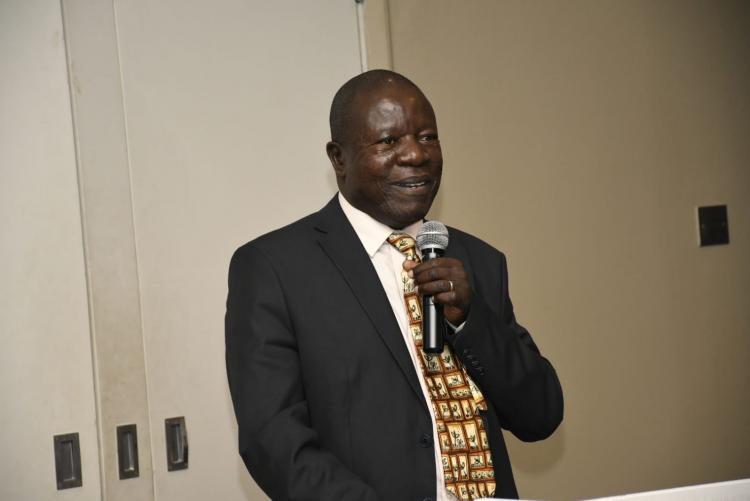The University of Nairobi proudly announces the exceptional achievement of Dr. Cromwel Lukorito, a distinguished Senior Lecturer in the Department of Earth and Climate Sciences, who has been selected as the Vice Chair of the Intergovernmental Panel on Climate Change (IPCC) Working Group II. This prestigious appointment was officially confirmed on June 28, 2023, marking a momentous recognition of Dr. Lukorito's expertise and outstanding contributions to the field of climate science.
Dr. Lukorito's role within the IPCC Working Group II encompasses a broad range of responsibilities that are pivotal in addressing the urgent challenges posed by climate change. The Working Group II focuses on assessing the vulnerability of socio-economic and natural systems to the impacts of climate change, while also exploring potential avenues for adaptation. In light of this, Dr. Lukorito outlines his strategic priorities for this role:
Building a Robust Scientific Network: Dr. Lukorito aims to develop a comprehensive database of climate and allied scientists across Africa, fostering a rich pool from which to select key contributors to IPCC reports.
Enhancing African Climate Research: He plans to convene Africa's scientific community to identify knowledge gaps and inform the scope of upcoming IPCC reports. This approach seeks to drive targeted climate change research, thereby bolstering adaptation efforts.
Global Scientific Collaborations: Leveraging the University of Nairobi's extensive interuniversity collaborations, Dr. Lukorito envisions establishing a formidable scientific research consortium. This network will address the goals set forth in the IPCC's assessment reports.
Amplifying African Research Impact: By mobilizing resources and support, Dr. Lukorito aims to facilitate the publication of research findings by African scientists in high-impact scientific journals, strengthening the global reference base for IPCC assessments.
Empowering Climate Resilience: Identifying and collaborating with researchers in Africa, Drr. Lukorito seeks to bolster capacity building, technology development, and transfer initiatives to enhance climate resilience in vulnerable regions.
In a candid conversation, Dr. Lukorito reflects on his journey as a climate scientist with a specialization in adaptation, particularly in African food systems. His significant accomplishments include leading transformative projects supported by esteemed institutions like the Rockefeller Foundation and IDRC/CCAA AfricaAdapt. Moreover, his pioneering work in climate change curriculum development for the Media Council of Kenya underscores his commitment to broader awareness and engagement.
The impact of Dr. Lukorito's work extends beyond academia. His contributions have led to the mainstreaming of climate change adaptation measures into development plans of key Kenyan counties, fostering resilience and sustainable progress.
Regarding his election as Vice Chair of IPCC Working Group II, Dr. Lukorito shares that his extensive experience in climate science, coupled with a compelling three-point lobbying platform, set him apart. This platform emphasized the robust academic and research linkages of the University of Nairobi, Kenya's strength in climate and allied natural sciences, and the unique convening power of the nation to drive a common agenda.
Expressing gratitude for the overwhelming support, Dr. Lukorito acknowledges that his journey as a climate scientist is marked by a multitude of impactful studies, ranging from climate suitability assessments for staple crops like maize and sorghum to the effects of climate variability on agriculture and indigenous livelihoods.
In his role as Vice Chair of IPCC Working Group II, Dr. Lukorito recognizes the urgency of addressing climate change's profound challenges. He underscores the growing vulnerability to extreme climate events and stresses the importance of:
Strengthening Scientific Capacity: By developing a critical mass of scientists across various disciplines, Mr. Lukorito aims to enhance Africa's ability to confront climate change impacts.
Integrating Climate Change into Institutions: Supporting academic and research institutions to mainstream climate change considerations into their routine operations and development strategies.
Fostering Innovation: Mobilizing resources for research and climate-smart innovations that drive low-emission, climate-resilient development in Africa.
Enhancing Monitoring and Early Warning: Advocating for improved weather and climate monitoring infrastructure in Africa to bridge data gaps and enhance early warning capabilities.
Dr. Lukorito's appointment has been met with acclaim, receiving a resounding 101 votes in his favor. He attributes this strong support to his demonstrated strength in climate science, his extensive research portfolio, and the compelling three-point platform that resonated with the electorate.
Looking ahead, Dr. Lukorito envisions an IPCC Working Group II that actively raises awareness about climate change impacts and vulnerabilities. This vision encompasses robust leadership, comprehensive outreach, and collaboration with institutions and experts worldwide.
As he steps into his new role, Dr. Lukorito is determined to leverage this appointment for the greater benefit of his home institution, the University of Nairobi. He envisions enhanced collaboration opportunities for students pursuing climate change studies. These benefits include increased access to scholarships, recognition as a center of excellence in adaptation, and amplified interuniversity partnerships.
In closing, Dr. Lukorito extends a passionate call to young individuals aspiring to embark on a career in climate science. He encourages them to embrace a multidisciplinary approach, leverage technology, and be innovative in addressing the pressing challenges of our changing climate. Through such endeavors, they can play a pivotal role in shaping a sustainable and resilient future for all.

